18 December, 2025 - DSGE Model with Fiscal Block: The Case of Kazakhstan
n this research seminar, economists from the National Bank of Kazakhstan (NBK) presented a benchmark small‑open‑economy DSGE model augmented with a rich fiscal block to study alternative ways of financing an increase in government spending. The model features optimizing households (Ricardian and non‑Ricardian), monopolistically competitive intermediate firms with Calvo price rigidity and indexation (yielding a domestic Phillips curve), a standard Taylor‐rule monetary authority, and an explicit government sector with VAT, personal income tax (PIT), lump‑sum taxes, domestic debt issuance, and transfers from the sovereign oil fund (National Fund). Market‑clearing conditions close the system Read More
October 22, 2025 - Quarterly Projection Model (QPM) of the Ministry of Finance of Georgia
In this research seminar, economists from Georgia’s Ministry of Finance presented their Quarterly Projection Model (QPM), developed to strengthen macroeconomic forecasting and policy analysis and used as an integral part of the Forecasting and Policy Analysis System (FPAS). The presentation began with a recap of FPAS, which combines structural DSGE models, econometric and machine learning approaches, and spreadsheet-based revenue forecasting. The QPM was introduced to address capacity gaps and staff turnover, and to provide a flexible, quarterly framework for medium-term analysis and improved communication with policymakers. Read More
October 15, 2025 - A Macroeconomic Framework for Long-Term Resilience and Growth
In this research seminar, experts from the IMF Fiscal Affairs Department presented a macroeconomic framework designed to integrate climate shocks and adaptation policies into long-term growth and fiscal sustainability analysis. The session featured Andrew Ceber and Pedro Juarros, who provided an in-depth overview of their model and its application to real-world case studies Read More
28 August, 2025 - Using Non-Traditional Data Sources for Nowcasting CPI in Central Bank of Armenia
In a recent research seminar, experts from the Central Bank of Armenia’s Statistics Department—Tigran Baghdasaryan and Kristine Karapetyan—gathered to discuss innovative approaches to measuring inflation, focusing on the use of non-traditional data sources for nowcasting the Consumer Price Index (CPI). The seminar opened with a discussion of the limitations of traditional inflation statistics Read More
29 May, 2025 - Drivers of Inflation in the Caucasus and Central Asia
In a recent research seminar, IMF experts and authorities gathered to discuss the pressing issue of inflation in the Caucasus and Central Asia (CCA). The seminar featured a key presentation from Nasir Rao of the IMF, and interventions from Alisher Tolepbergen from the National Bank of Kazakhstan, and Marykhonum Tangriberdieva from the Ministry of Economy and Finance of Uzbekistan, aimed to uncover the intricate drivers of inflation in the region. Read More
17 April, 2025 - Changes in Credit Standards and the Macroeconomy: Evidence from Mongolia
The seminar explored a collaborative research paper by the staff of the Bank of Mongolia and the International Monetary Fund (IMF). The focus was on understanding the fluctuations in credit standards and their macroeconomic ramifications in Mongolia, an economy heavily influenced by mining exports. The event aimed to analyze how credit standards impact economic growth and inflation in Mongolia, discuss the challenges of differentiating between credit supply shocks and demand factors, and share insights and best practices for macroeconomic modeling relevant to emerging economies Read More
28 March, 2025 - Nonlinearities and state-dependence in the monetary transmission mechanism: Evidence from a commodity-dependent economy
In a recent research seminar, Arman Juragat from the Bank of Mongolia presented an insightful paper titled "Nonlinearities and State Dependence in the Monetary Transmission Mechanism: Evidence from a Commodity Dependent Economy," with a focus on Mongolia's unique economic landscape. The speaker pointed out that recent research suggests the effectiveness of monetary policy is not uniform; rather, it is state-dependent, varying significantly based on current economic conditions. This observation led to the core of the seminar: an exploration of how monetary policy impacts the economy under different states Read More
13 December, 2024 - Macro-Financial Model of the Bank of Mongolia
The seminar addressed the critical interplay between macroeconomic stability and the financial system, focusing on the Macro-Financial Model developed by the Bank of Mongolia. Understanding this dynamic is essential for policymakers to effectively manage economic shocks and implement appropriate macroprudential policies. Read More
27 November - Social Acceptability of Structural Reforms
The research seminar focused on the social acceptability of structural reforms, a topic featured in the October 2024 edition of the International Monetary Fund’s (IMF) World Economic Outlook (WEO). As governments worldwide strive to implement necessary structural reforms for economic growth, they face increasing public resistance, which has intensified since the financial crises of 2008-09. This resistance poses significant challenges to policymakers, leading to a marked decline in the pace of reforms. Read More
22 November, 2024 - Social Acceptability of Structural Reforms
The research seminar focused on the social acceptability of structural reforms, a topic featured in the October 2024 edition of the International Monetary Fund’s (IMF) World Economic Outlook (WEO). As governments worldwide strive to implement necessary structural reforms for economic growth, they face increasing public resistance, which has intensified since the financial crises of 2008-09. This resistance poses significant challenges to policymakers, leading to a marked decline in the pace of reforms. Read More
November 22, 2024 - The Nexus of Climate and Monetary Policy: Evidence from the Middle East and Central Asia
Climate shocks, such as floods and droughts, have been disrupting economic growth in many countries, leading to significant consequences for inequality and food security. Therefore, understanding the impact of these shocks on the economy is crucial for policymakers to design effective, preemptive policy actions. The current research seminar focuses on the interaction between climate shocks and monetary policy, specifically analyzing their effect on inflation in the Middle East and Central Asia (MECA) region. Mr. Nordine Abidi presented the mechanisms through which climate shocks could affect inflation. Read More
Research seminar: Nowcasting with High Frequency Data, Google Trends and Machine Learning?
Due to the significant delay in the availability of GDP data, modern economists have developed nowcasting models to estimate the current state of economic activity in real time. Advancements in computing power and the availability of big data have led economists to use machine learning (ML) algorithms to enhance the precision of these nowcasting models. This research seminar focuses on nowcasting GDP growth and identifying its turning points for Georgia in real time by utilizing Google Trends data and ML algorithms. The forecasting performance of various ML algorithms is compared with more traditional AR(1) models and dynamic factor models (DFM). Read More
July 4, 2024 -A Workhorse DSGE Model of the National Bank of Georgia
In response to the growing interest among policymakers in building New Keynesian Dynamic Stochastic General Equilibrium (NK DSGE) models in the Caucasus, Central Asia, and Mongolia region, CCAMTAC organized a research seminar dedicated to the workhorse NK DSGE model used at the National Bank of Georgia (NBG). During this seminar, the authors explored innovative features that enhance the traditional NK DSGE model, aligning it with the unique structural characteristics of Georgia. Read More
March 19, 2024 - FINEX - A New Workhorse Model for Macroeconomic Forecasting and Policy Analysis
The research seminar was dedicated to the presentation of FINEX - the new workhorse model of the Institute for Capacity Development (ICD) of the International Monetary Fund (IMF). FINEX is a semi-structural macroeconomic model for policy analysis and forecasting that can be used in countries with imperfect capital mobility and hybrid monetary policy regimes. Read More
February 29, 2024 - US Monetary Policy Spillovers to Middle East and Central Asia: Shocks, Fundamentals, and Propagations
The research seminar was dedicated to the spillovers of US monetary policy shocks to the Caucasus, Central Asia and Middle East (CCAME) region. As inflation started rising in 2022-23 most central banks responded by raising the policy rates and committed to monetary policy tightening until inflation would fall to the target. Amid the global monetary tightening cycle most central banks closely monitored the monetary policy stance of the Fed in accommodating inflation due to the significant spillover effects it could have on the rest of the world. Read More
February 8, 2024 - Monetary Policy Communication in the Caucasus, Central Asia and Mongolia
One of the most important elements of monetary policy frameworks (MPFs) for inflation-targeting economies is the communication of monetary policy. As inflation surged globally in 2022-2023, most central banks actively resorted to contractionary monetary policy by raising the policy rates, and communication was key in conveying the stance of monetary policy to the public and financial markets. This research seminar was dedicated to the analysis of monetary policy communication in the Caucasus, Central Asia, and Mongolia (CCAM) region, and comparing the performance of central banks in terms of communication between emerging markets (EM) and advanced economies (AE). Read More
August 29, 2023 - Predicting the demand for CBDC using survey data for Kazakhstan
Due to the rapidly growing digitalization of payment systems across the globe, central banks are exploring the benefits and costs of issuing their own digital currencies, commonly referred to as Central Bank Digital Currency (CBDC). To assess the impact of CBDC issuance on the economy central banks need to know how much demand for CBDC exists and the key characteristics of CBDC that affect the demand for it. Read More
July 27, 2023 - Fiscal Rules in a DSGE model for Kazakhstan
The research seminar addressed the relevance of fiscal rules as a stabilization tool for a commodity-exporting economy. The main purpose of the research was to analyze the cyclicality of fiscal policy under different fiscal rules and their effect on welfare and macroeconomic stability in a dynamic stochastic general equilibrium (DSGE) model for Kazakhstan. Read More
May 18, 2023 - Seigniorage and Currency-in-Circulation in a digital era
The current research seminar addresses the importance of the relationship between seigniorage and currency-in-circulation for all IMF member countries in times of digitalization of payment instruments and lower inflation. Recent technological advancements and innovations in payment systems should result in a decreasing demand for money that originates from the higher velocity of digital payment instruments. This phenomenon impedes central banks’ ability to generate seigniorage by trading non-interest bearing money against interest-bearing assets.. Read More
March 30, 2023 - Measuring Regional Inequality in Kazakhstan
In economics, it is common to look at aggregate macroeconomic data to measure country or regional development and prosperity, such as GDP per capita. However, there are more specific indicators that focus on measuring the population’s wellbeing, income distribution, and inequality. To learn more about regional inequalities, the Asian Development Bank (ADB) commissioned a series of studies to benchmark the nature and features of inequalities among Kazakhstan’s regions (oblasts). Read More
March 16, 2023 - The Labor Market in Kazakhstan: On the Way to a Digital Reality
The labor market in Kazakhstan will be largely affected by demographics, with many young workers entering the market, as well as digitalization, resulting in the increasing role of digital jobs. While the pandemic created a major shift in labor market demand in the past few years, a more recent migration will also affect the labor market developments in the region. Read More

February 23 & March 9, 2023 - An Estimated DSGE Model for Integrated Policy Analysis
The outcome of any important macroeconomic policy change is the net effect of forces operating on different parts of the economy. central challenge facing policymakers is how to assess the relative strength of those forces. Dynamic stochastic general equilibrium (DSGE) models are the leading tool for making such assessments in an open and transparent manner. Read More
February 2, 2023 - Raising Armenia’s Export Performance
Raising Armenia’s long-term growth prospects is critical to increase jobs, achieve higher living standards, and slower or stop emigration. Based on a co-authored IMF working paper, Nathalie Reyes and Yulia Ustyugova (paper with Klakow Akepanidtaworn and Lili Karapetyan) started by providing an overview of Armenia’s export performance and analyzed factors and policy variables that affect export performance and its composition. Read More
November 29, 2022 - Disentangling the effect of supply and demand factors on bank lending. Evidence from Bank Lending Survey in Azerbaijan
Credit to the economy is a crucial aspect of economic policy. While monetary authorities consider credit channel when affecting inflation via policy rates, credit extension also helps to analyze the state and outlook for the economy. As a result, credit dynamics and conditions affecting credit market developments have been studied by policymakers from various perspectives. Recently the Central Bank of Azerbaijan conducted research to identify the effect of supply and demand factors on bank lending and stepped forward to share their findings with the CCAMTAC community. Read More
December 14, 2022 - Reducing Dollarization in the Caucasus and Central Asia
Declining but still, high dollarization rates in the Caucasus and Central Asia (CCA) region affect macroeconomic stability, monetary policy transmission, and financial sector development. Although several studies have investigated the dynamics of dollarization in the CCA, the relative roles of macro-financial policies and financial market development in the de-dollarization process have not yet been assessed empirically. The IMF’s working recent paper takes stock of de-dollarization efforts and explores the short-term drivers of financial de‐dollarization in the CCA region. Read More
September 1, 2022 - Can Teachers Learn Online?
The COVID-19 pandemic has forced a shift from traditional face-to-face instruction to online learning. After two years of distance/virtual learning, the question of the effectiveness of such delivery modality became relevant, as in-person delivery is being resumed in many countries, but the option of online learning remains present. From a policy standpoint, gauging the effectiveness of remote learning is crucial for designing and implementing tailored policies in areas of academic and professional education Read More
July 28, 2022 - Monetary Policy Frameworks: An Index and New Evidence
In her presentation, Ms. Filiz Unsal, one of the main developers of the IAPOC index, gave a very detailed explanation of the intuition behind the index, the methodology and the data collection process, and shared the main evidence obtained from the analysis of the index in terms of global and regional trends in monetary policy frameworks Read More
July 1, 2022 - Foreign Exchange Interventions as a Form of Unconventional Monetary Policy
In the aftermath of the financial crisis, central banks from several small open economies have used foreign exchange (FX) interventions in order to stimulate economic activity and inflation, as their policy rates were close to the effective lower bound. How effective are such interventions and what is the broader economic impact? Read More
June 22, 2022 - Microsimulation for Policymakers: POLSIM Model and its Applications
In his opening remarks, Norbert Funke highlighted that this was the first CCAMTAC research seminar given by one of CCAMTAC’s development partners, and he thanked Marta Skrzyńska, the Polish steering committee member, for the initiative. Presentations not only by country authorities, but also development partners and IMF staff will further support peer learning. Read More
April 14, 2022 - Financial Development and Growth in the Caucasus and Central Asia
According to IMF’s multidimensional index of financial development, CCA countries have made progress following their independence in the early 1990s. However, the progress was uneven across the CCA, resulting in a divergence of financial development over time and mixed performance relative to EM and LIC peers. Read More
March 31, 2022 - Financial DSGE Model for Azerbaijan Economy, Estimation, Forecasting, and Welfare Analyses
Mr. Elchin Mustafayev presented a draft paper, prepared jointly with Ms. Nazrin Ramazanova, a CBA colleague, which used a small open economy dynamic stochastic general equilibrium model, with a financial accelerator and imperfect exchange rate pass-through, to provide a qualitative and quantitative characterization of the optimal monetary policies for Azerbaijan. Read More
November 4, 2021 - Ararat Fiscal Strategy Model of the Ministry of Finance of Armenia and Covid-19 Scenario
The Seminar focused on the Minsitry of Finance of Armania's path to building a solid analytical capacity in dynamic stochastic general equilibrium (DSGE) modeling. As a result, the Armenian team constructed a micro-founded small open economy model with New Keynesian features. Read More
October 5, 2021 - Sterilized Interventions May Not Be So Sterilized
The research by Shalva Mkhatrishvili, Giorgi Tsutskiridze and Lasha Arevadze suggests that when the collateral base for central bank operations is not huge, sterilized interventions may still affect interest rates, loan extension and, hence, the real economy (beyond the effects of exchange rate changes). Read More
September 28, 2021 - Consumer Credit Risk Analysis via Machine Learning Algorithms
The paper provides a useful example of how the central bank of Kazakhstan assesses the creditworthiness of individuals through machine learning algorithms, based on regulatory data provided by second-tier banks to the central bank. Read More
July 22, 2021 - Currency Depreciations and Savings Behavior: Evidence from Household Deposits in Armenia
In the paper Aleksandr Shirkhanyan (Central Bank of Armenia, co-authors: Diego Jimenez-Hernandez and Joshua J. Kim (both Stanford University) analyzed how households make such savings decisions following a large currency depreciation in Armenia. Read More

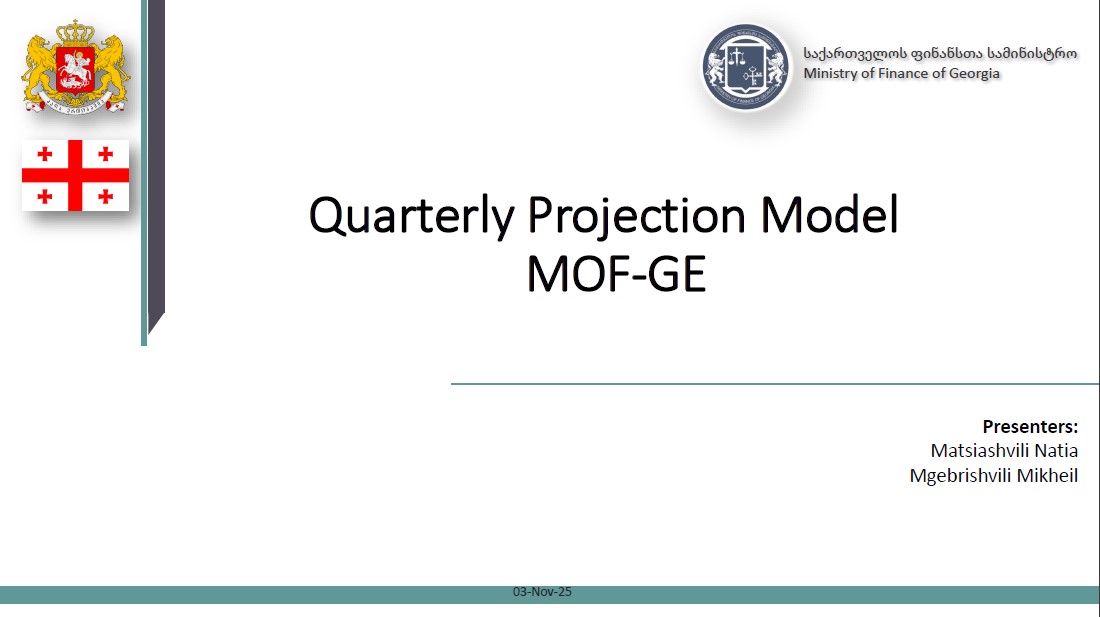
.jpg)
.png)




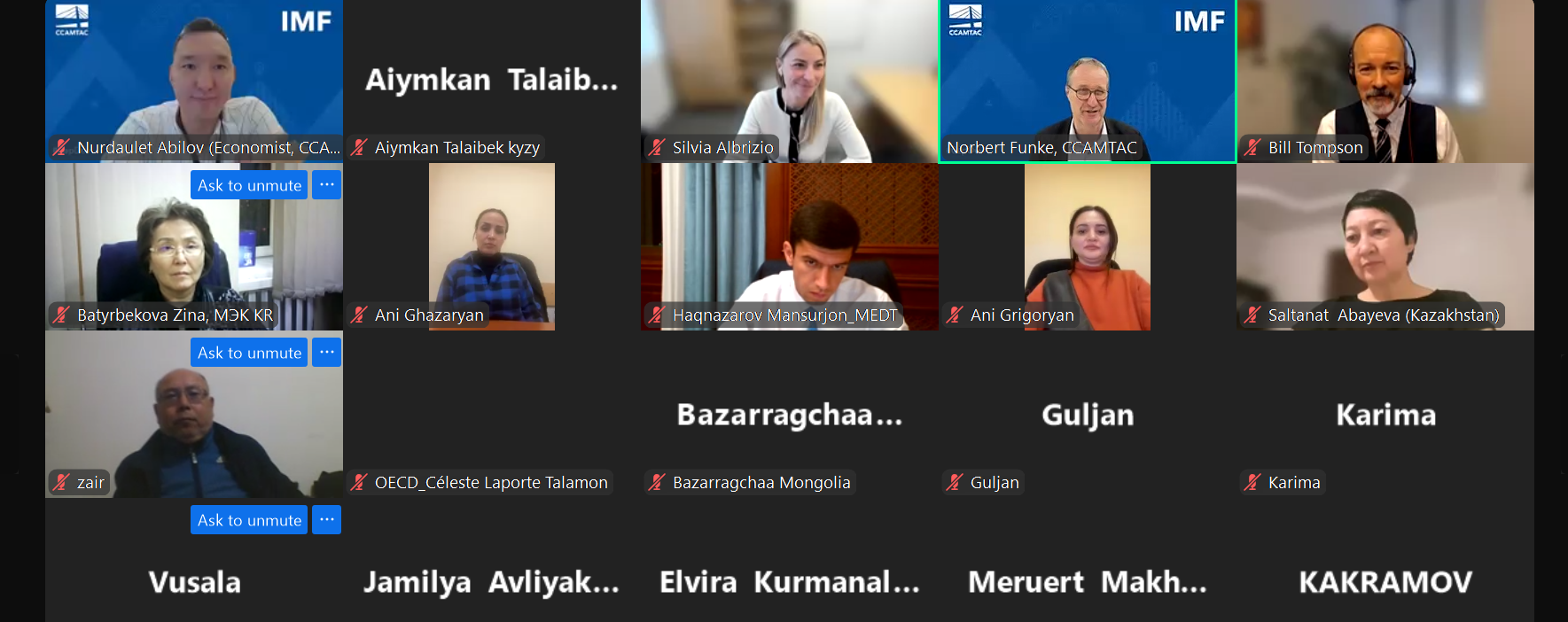
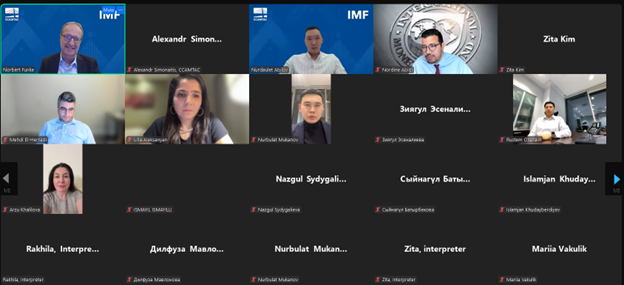
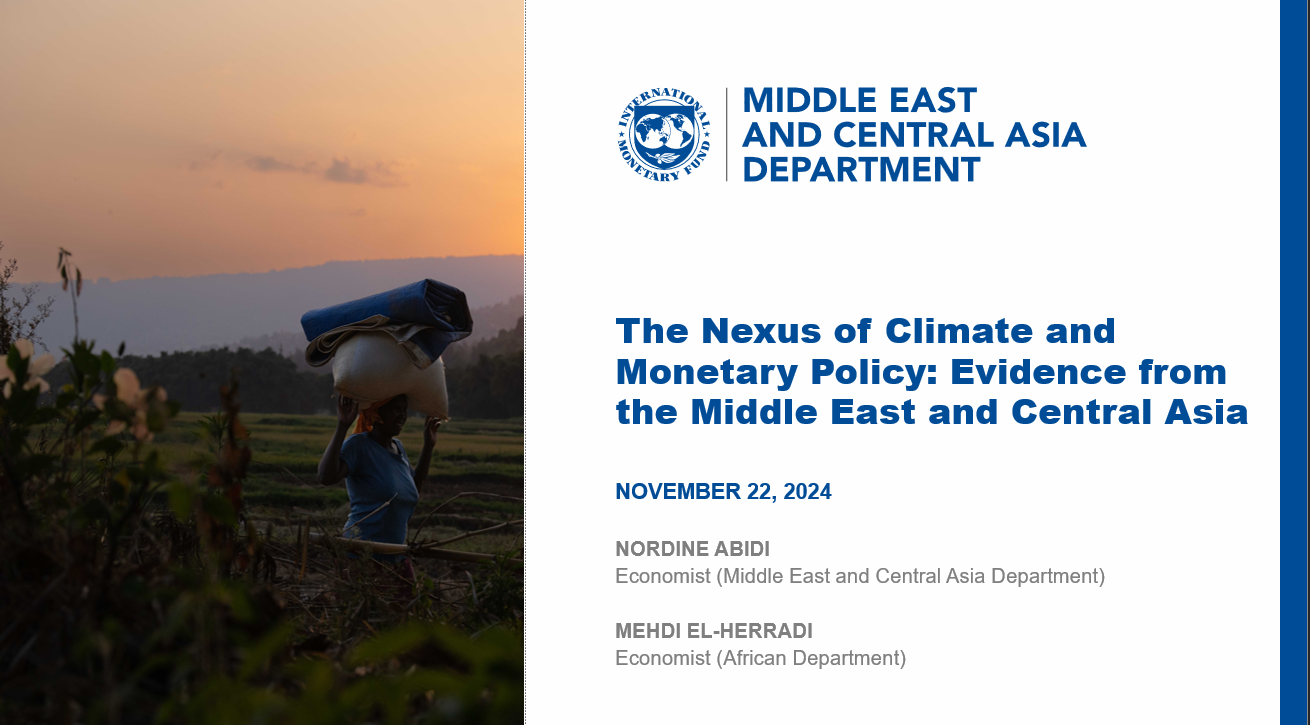


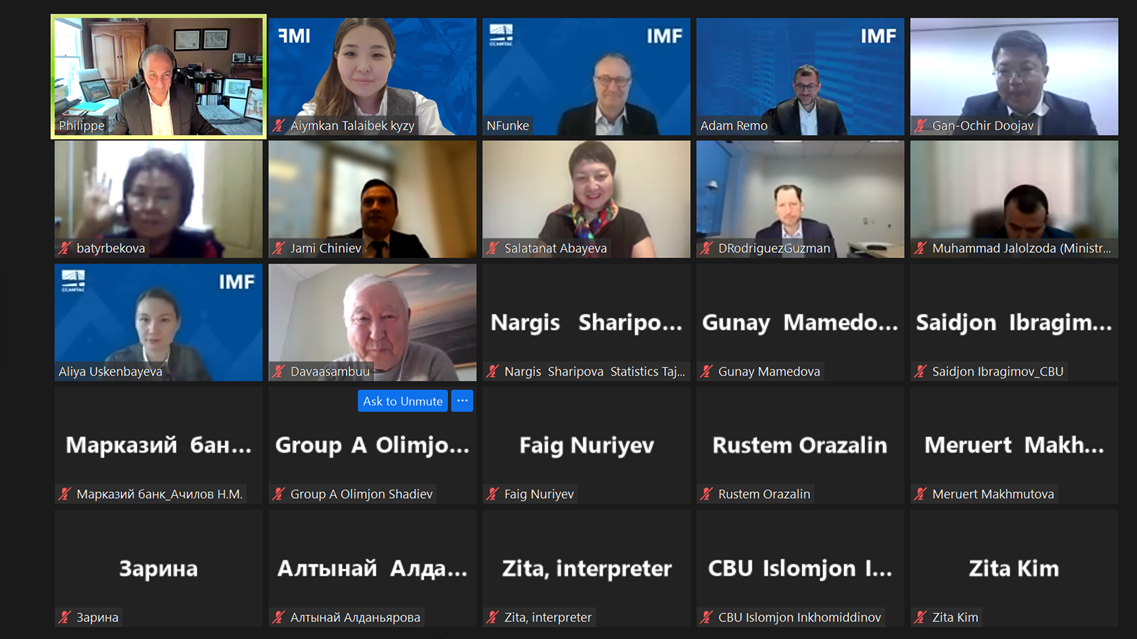



.PNG)











